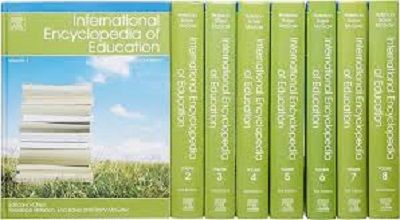International Encyclopedia of Education
The International Encyclopedia of Education is a comprehensive reference work that provides an overview of the field of education. It covers a wide range of topics, including educational theory, history, policy, and practice. The encyclopedia is organized into 12 volumes. Each of which is devoted to a specific area of education.
The encyclopedia is a valuable resource for students, researchers, and practitioners in the field of education. It provides a wealth of information on a variety of topics. It is written in a clear and accessible style. The encyclopedia is also regularly updated. So it remains a current source of information on the latest developments in education.
Here are some of the key features of the International Encyclopedia of Education:
- It is a comprehensive reference work that covers a wide range of topics in education.
- Written by leading scholars and practitioners in the field of education.
- Organized into 12 volumes, each of which is devoted to a specific area of education.
- Regularly updated to ensure that it remains a current source of information.
- Available in both print and online formats.
Human rights education
Human rights education (HRE) is a process of teaching, learning, and awareness-raising that aims to build a universal culture of human rights. The goal is to empower individuals to understand, exercise, and promote human rights in their daily lives. Human rights education encompasses various levels, from formal education in schools to informal learning in communities. Here are some key aspects of human rights education:
Foundational Principles:
- Universality: Human rights are inherent to all individuals, regardless of nationality, ethnicity, gender, or other characteristics.
- Inalienability: Human rights cannot be taken away or surrendered.
- Interdependence and indivisibility: All human rights are interconnected, and the violation of one right often affects others.
Objectives of Human Rights Education:
- Awareness: Increase awareness and understanding of human rights principles and values.
- Respect: Foster respect for diversity and the dignity of each person.
- Critical Thinking: Develop critical thinking skills to analyze human rights issues and challenges.
- Empowerment: Empower individuals to take action to promote and protect human rights.
Formal and informal settings:
- Formal Education: Integration of human rights education into formal school curricula at all levels.
- Informal Education: Promotion of human rights values through community programs, non-governmental organizations (NGOs), and public awareness campaigns.
Methods and Approaches:
- Interactive Learning: Use participatory and experiential methods to engage learners actively.
- Case Studies: Explore real-life examples of human rights violations and successes.
- Role-playing: Encourage students to understand different perspectives by taking on roles in simulated scenarios.
Human Rights Education and Sustainable Development:
Recognizing the role of human rights education in achieving sustainable development goals, including social justice, equality, and environmental sustainability.
Global Initiatives:
Various international organizations, such as UNESCO, UNICEF, and the Office of the United Nations High Commissioner for Human Rights (OHCHR), promote and support human rights education globally.
Challenges:
Challenges in implementing human rights education include resistance from certain governments, cultural barriers, and the need for effective teacher training.
Final Words
Human rights education plays a crucial role in creating informed and empowered citizens who contribute to the promotion and protection of human rights on a local and global scale.
